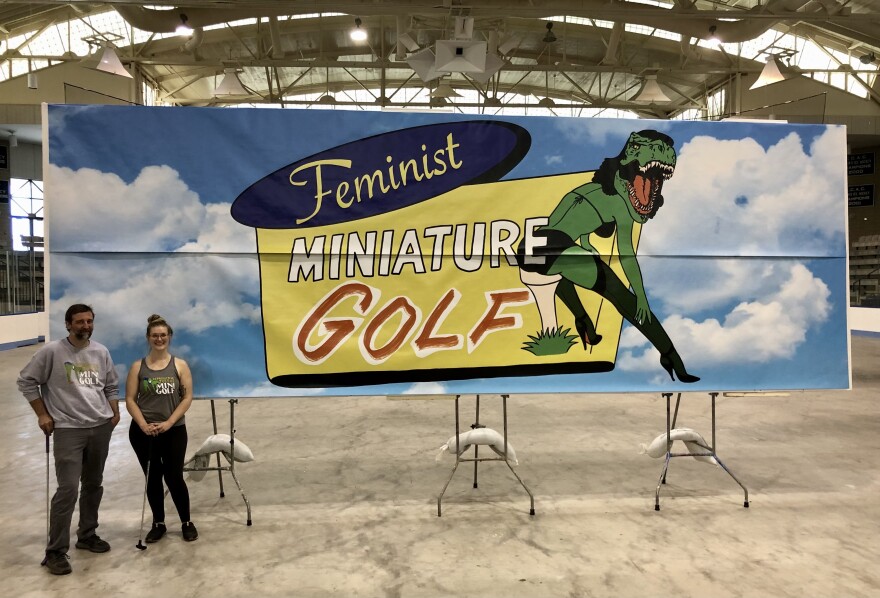With summer in full swing, so are the golf clubs. In Middlebury, a new mini golf course is putting a unique twist on the old favorite. Vermont Public's Jenn Jarecki talks with the organizers of Feminist Mini Golf, Carly Thomsen and Colin Boyd. Their conversation below has been edited and condensed for clarity.
Laying within Middlebury's College hockey rink is Reproductive Justice Mini Golf, aka Feminist Mini Golf — an 11-hole playable course that currently takes up half of the rink. The idea was conceived by Carly Thomsen, who teaches gender, sexuality, and feminist studies at Middlebury.
“The whole reproductive justice mini golf course in an example of how we can use art and aesthetics in interesting ways for purposes of social justice,” Thomsen said.
The kaleidoscopic course blends the vivid cotton candy world of traditional mini golf within a complex art installation that addresses issues related to reproduction, like surrogacy, science and medicine and contraception. Other holes frame reproductive justice in terms of incarceration, sex ed and the court system.
There’s a mascot. You’ll find a series of brightly painted pin-up style dinosaurs you’ll find at every hole. You’ll also hear audio and student experimental films throughout the course.

“The mini golf course could seem pretty heavy if you’re engaging with all of these complicated and not terribly rosy reproductive justice topics," Thomsen said. "So we thought that one way to make it feel more mini-golf-like, rather than just like a depressing feminist museum, [is] for there to be some aesthetic levity. So the dinosaur is the kind of monstrous image that you often see at mini golf courses. There are a lot of things that are kitschy and campy. So, we wanted to reproduce that aesthetic because it is a mini golf course."
There are QR codes for those seeking more information about the topics addressed throughout the course. A solitary confinement cell built to scale. There’s even a bar at the last hole.
“This whole thing to me seems like a monument to the value of collaboration,” Thomsen said.
The course was designed and built by students of both Thomsen and co-curator, Colin Boyd, who also teaches at Middlebury. To create Feminist Mini Golf, they partnered with academics across the country, Middlebury alumi, and the Trailblazers Program at Vermont Works for Women, among many others. They hope to get players thinking and talking about reproductive justice. As Boyd points out, everyone will experience the course differently.
“Any visitor that comes, whether they’re just coming to play miniature golf, is that they’re going to pick up on some element of that and hopefully that stirs something," Boyd said. "Whether it’s a conversation or it’s, like, an argument about the issues in this world and these very real challenges.”

These "very real" challenges become obstacles and distractions among the holes. Like having to hold a doll like a baby while you putt at the Care Work hole, or finding a way to get your ball through the maze of transportation challenges that can arise when attempting to access reproductive care.
The course collided headfirst with current events — given the U.S. Supreme Court’s ruling last June overturning Roe v. Wade and legislatures across the country rolling back reproductive rights.
Last November, here in Vermont, voters overwhelmingly passed a constitutional amendment enshrining the right to abortion care. This spring, lawmakers became the first in the country to pass a bill protecting health care workers who provide gender-affirming and reproductive care.
Thomsen acknowledges those efforts, but believes Vermont has a long road ahead if it aims to be reproductively just.
“Abortion rights are not the same as abortion access, and I think that’s a very important distinction when Vermonters are feeling very good about ourselves,” Thomsen said.
Thomsen hopes the course helps make these issues more tangible. She’s frequently uses this approach, called game making, in her classroom.

“Having something playable draws people in who might not take a gender studies class," Thomsen said. "But the fact that it’s a game it makes it seem less serious, or maybe like it’ll be less hamfisted or dogmatic and like there’s the possibility for conversation, because that is always a part of playing a game... You don’t just sit and play a game in silence. … Students practicing talking about ideas from class. Their ideas with people outside of class has made their ability to talk about those ideas in class much stronger.”
This is why it was really important that the course eventually be free and open to the public.
“There’s some really hilarious instances that happened with children on the course that went over their heads but their parents found very entertaining, so that’s a good reason to come with your kids,” Boyd said with laughter.
Boyd and Thomsen opened the course to the public on May 12, welcoming families and community members to play and learn.
“The kinds of conversations that this course is helping to raise, or that we hope it inspires, there’s not really an age limit on them," Thomsen said. "Like, at what point should you start thinking about bodily autonomy? Well, to me, I think you should be having that conversation really young. There’s age appropriate ways to talk about contraception, and I think that parents have the tools that they need to be able to lead their children through in a way that makes sense for their own individual children.”
The course is free and open on Thursdays, Fridays and Saturdays through mid-July.
Have questions, comments or tips? Send us a message.


